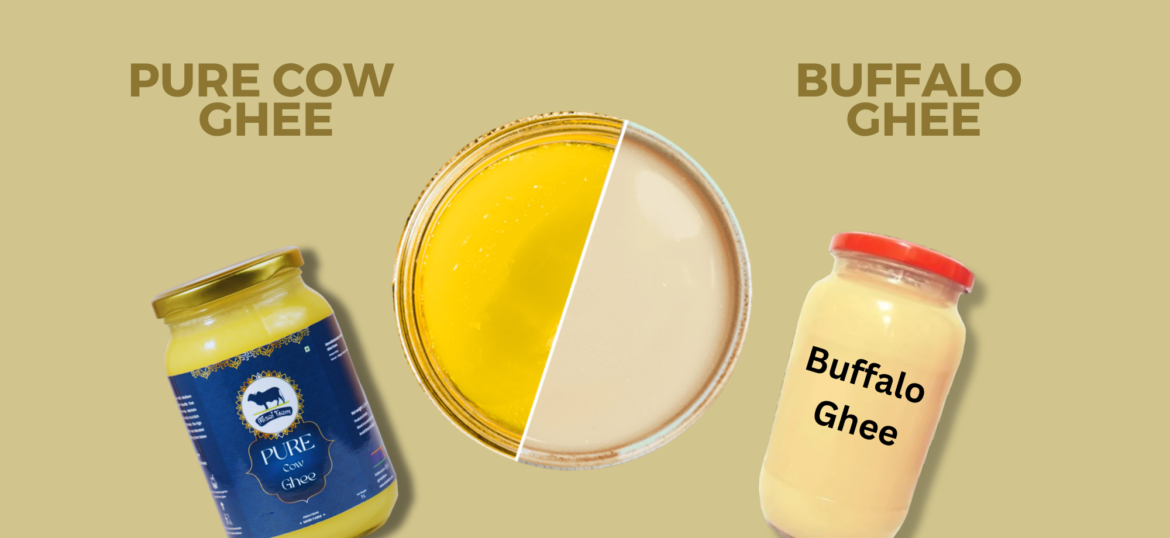In the world of cooking oils, ghee holds a special place. Loved for its rich flavor and numerous health benefits, ghee has been used for centuries in traditional Indian cuisine. But when it comes to choosing between cow ghee and buffalo ghee, confusion often arises. Which one is better for your health? Let’s find out the details.
Health Benefits of Ghee:
Before we dive into the cow ghee vs. buffalo ghee debate, let’s take a quick look at the health benefits of ghee.
1. Rich Source of Healthy Fats: Ghee is primarily composed of saturated fats essential for various bodily functions. These healthy fats help in hormone production, cell membrane structure, and nutrient absorption.
2. Rich in Fat-Soluble Vitamins: Ghee is a good source of fat-soluble vitamins like A, D, E, and K. These vitamins play crucial roles in maintaining healthy vision, skin, immune function, and blood clotting.
3. Promotes Digestive Health: Ghee contains butyric acid, a short-chain fatty acid that supports digestive health by nourishing the cells of the intestines and reducing inflammation.
4. Boosts Immunity: The antioxidants present in ghee help strengthen the immune system and protect the body against infections and diseases.
5. Supports Weight Management: Contrary to popular belief, moderate consumption of ghee can help in weight management by providing a feeling of satiety and promoting fat metabolism.
Cow Ghee Benefits:
Cow ghee, also known as desi ghee. It offers its own set of unique advantages:
1. High in Nutrients: Cow ghee stands out for its rich nutrient profile. It contains essential vitamins such as A, D, E, and K, along with crucial fatty acids. These nutrients play vital roles in various bodily functions, from supporting vision and bone health to boosting immune function and aiding blood clotting.
2. Easier to Digest: One of the key advantages of cow ghee is its ease of digestion. Compared to other cooking oils, cow ghee is lighter on the stomach, making it a suitable option for individuals with digestive issues or sensitive stomachs.
3. Balances Doshas: In Ayurveda, the traditional system of medicine in India, cow ghee is highly revered for its ability to balance the three doshas: Vata, Pitta, and Kapha. According to Ayurvedic principles, imbalances in these doshas can lead to various health issues. Cow ghee is believed to have a harmonizing effect on the doshas, promoting overall health and well-being.
4. Boosts Brain Function: Cow ghee boosts brain function due to its medium-chain fatty acids, known for their neuroprotective properties. Whether you’re studying, working, or aging, cow ghee supports cognitive performance and brain health. Its nutrient-rich composition and easy digestion make it a versatile addition to any diet, providing valuable support for optimal brain function at any age.
Buffalo Ghee vs. Cow Ghee:
Now, let’s compare buffalo ghee with cow ghee to understand their differences and similarities.
1. Source of Milk: The primary difference between cow ghee and buffalo ghee lies in their source of milk. Cow ghee is derived from cow’s milk, while buffalo ghee is made from buffalo milk.
2. Nutritional Composition: Both cow ghee and buffalo ghee contain similar nutrients, including vitamins and healthy fats. However, buffalo ghee tends to have a higher percentage of fat compared to cow ghee.
3. Fatty Acid Profile: Buffalo ghee has a higher content of saturated fats, whereas cow ghee contains more unsaturated fats. The fatty acid profile of buffalo ghee may vary slightly depending on factors like breed and diet.
4. Flavor and Aroma: Buffalo ghee has a distinct flavor and aroma, which some people prefer over cow ghee. It has a richer and creamier taste, making it ideal for certain dishes like biryanis and desserts.
5. Digestibility: While both cow ghee and buffalo ghee are considered easy to digest, individuals with lactose intolerance or dairy sensitivities may find buffalo ghee easier to tolerate due to its lower lactose content.
Which Ghee is Better?
The question of whether cow ghee or buffalo ghee is better ultimately depends on individual preferences and dietary requirements. Here are some factors to consider:
1. Taste Preference: If you prefer a milder flavor and aroma, cow ghee may be the better choice for you. On the other hand, if you enjoy a richer and creamier taste, buffalo ghee might be more suitable.
2. Health Considerations: Both cow ghee and buffalo ghee offer similar health benefits. However, if you have specific dietary restrictions or sensitivities, such as lactose intolerance, you may find buffalo ghee easier to digest.
3. Culinary Uses: The choice between cow ghee and buffalo ghee can also depend on the type of dishes you’re preparing. Cow ghee is versatile and can be used in a wide range of recipes, while buffalo ghee adds a unique flavor to certain dishes.
4. Availability: In some regions, cow ghee may be more readily available and affordable compared to buffalo ghee. You can buy pure cow ghee from Misri Farm, known for its purity and originality.
In the end, both cow ghee and buffalo ghee have their own set of benefits and can be incorporated into a balanced diet in moderation. Whether you choose cow ghee or buffalo ghee, remember to opt for high-quality, organic varieties like Misri Farm Pure Cow Ghee for maximum health benefits. Ultimately, the choice between cow ghee and buffalo ghee boils down to personal preference and dietary needs. So, go ahead, and enjoy the rich flavor and goodness of ghee in your favorite dishes.




